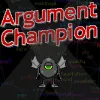Take a look inside 4 images
Argument Champion
Pros: Quirky, engaging, and encourages critical thinking and creative connections between topics.
Cons: No real logical connection between topics, and randomly assigned topics are not always appropriate.
Bottom Line: An interesting if unfinished concept that doesn't necessarily teach debate; rather, it satirizes the "logic" of debates themselves using, at times, language some will find unsuitable for classrooms.
Any teacher who uses Argument Champion should set the game up beforehand so that they can preview the topics and skirt around any potentially offensive or inappropriate topics. Teachers should also be careful that students who enjoy the game don't play it on their own, possibly leading to encounters with topics they (or their parents) may not appreciate. That said, Argument Champion could be useful as a whole-class activity played on an interactive whiteboard, where the teacher previews the topics. Its main value will be in the discussions it sparks, and teachers could follow up discussions with video of politicians or other persuasive speakers. Students could analyze how much of the speakers' claims are based in fact and logic and how much in emotion. It would also be interesting to break down the logic of the associations Argument Champion makes between words, and to pair Argument Champion with WordFlex, which makes similar associations between words, or even Little Alchemy, which associates concepts.
In Argument Champion, students face off in a debate either against another player or the computer. Each player chooses the topic of their debate. These topics, however, aren't like typical debates. They're just random words -- concepts, really -- like "royalty" or "make." Debaters can see what topics audience members love and hate (they appear as word bubbles above their heads). To win, players must connect things the audience loves with the topics they're arguing for, or connect things the audience hates with what their opponents support. To do this, the debater starts with the audience's word and clicks on associated words in a web, moving from one association to another until the audience's word connects with the debater's word. Each click of a word results in a few more associated words. For example, if a debater wants to connect the audience member's word "warmth" with his/her word "business," the player would click on "business," then "group," then "family," then "home," then "warmth." The key is to think creatively and predict the kinds of associations that could be made between words.
There are interesting opportunities in Argument Champion, but since it's a self-admitted "experimental game," these opportunities require some creative thinking. At first glance, one might assume Argument Champion teaches debate skills, but that's not really the case. What it does is encourage students to think critically about argumentation and the debate process itself (especially political debates). What connections are actually logical? When is the debater just making associations, or building an emotional connection with the audience? By getting rid of the baggage of actual debate topics, Argument Champion does a good job -- through parody -- of highlighting the absurdity of how debaters often take audiences for a bit of a ride by manipulating logic. With all that said, it's important to note that some of the topics (words like "dick" and "rape") are not appropriate for young audiences or some classrooms, so use with discretion or proper supervision.












